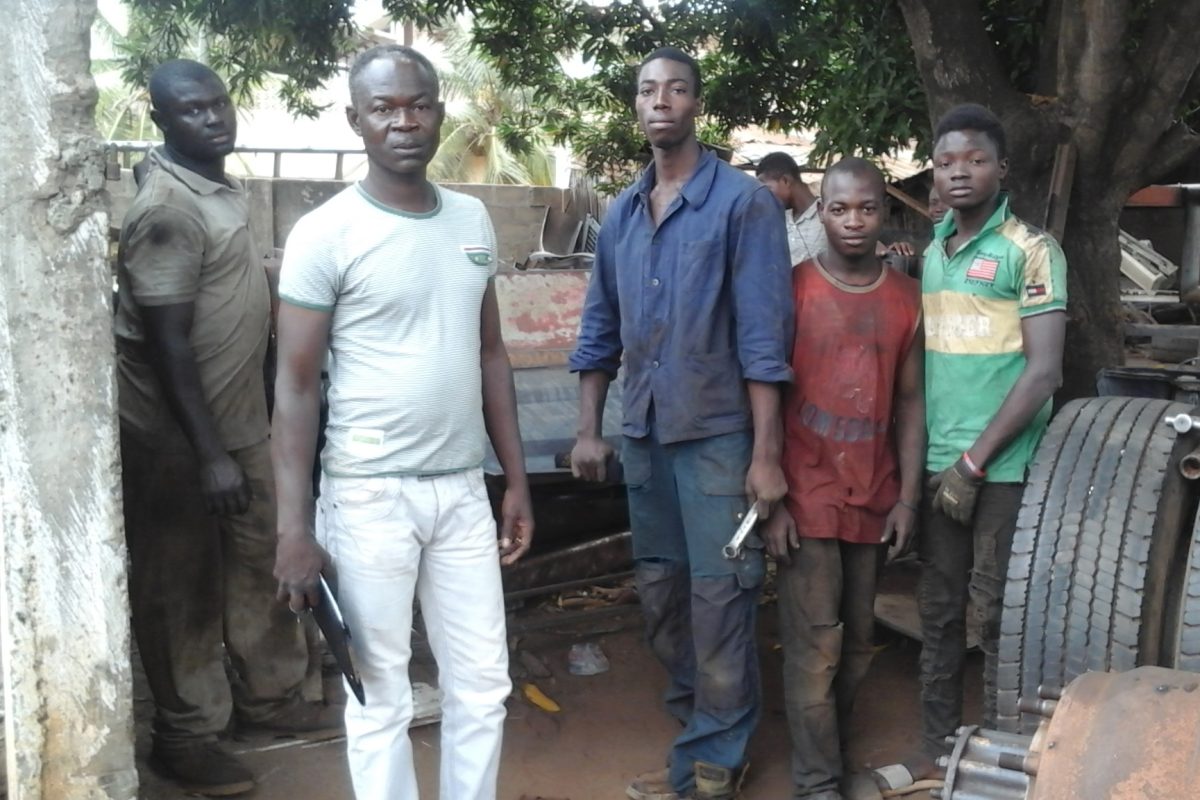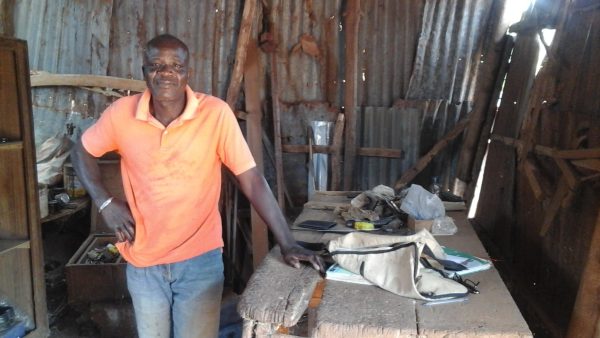
Car mechanics are an example of informal firms in Togo, Africa. A single owner/operator usually employs a few apprentices. Image credit: Paul Castañeda Dower.
Most countries rely on taxes to pay for public goods and services, but tax collection mechanisms differ greatly in low- versus high-income countries. A case in point is Togo, a West African country with a population of 8.7 million. Although tax evasion is more common in Togo than in the United States, tax revenue makes up 20% of its gross domestic product, one of the highest proportions in Africa.
The vast majority (86%) of Togo’s firms are classified as informal. Their revenue is below $100,000, and they typically consist of an owner/operator and a few apprentices. Examples include barbers, carpenters, mechanics and tailors. Taxes for informal firms range from 2.5% to 8.5% of revenue, depending on the business type.
Official records and business licenses exist for only 8% of these informal firms; the other 92% are essentially invisible to the state. Most business transactions are cash-based and undocumented by professional accountants. Tax officials go door-to-door during tax season to collect tax payments. Owed taxes are determined by visual inspections of the firm’s open work orders and assets, such as sewing machines for tailors. In this case, tax evasion may involve hiding assets or work orders before the collector’s visit.

Associate professor Paul Castañeda Dower and his University of Toronto colleague Moussa Blimpo examined whether a better understanding of the tax code would boost the informal sector’s tax participation rate.
“Not everybody is aware that taxes support the fiscal contract by which the state provides tax-funded benefits to its citizens,” says Dower. “We wanted to know if educating firm owners about the general purpose of taxation and their specific obligations would improve their willingness to pay, which is key for low-capacity settings that rely heavily on voluntary compliance.”
During their fieldwork in Togo’s capital Lomé, Dower and Blimpo provided tax law training to the Center for Research and Opinion Polls (CROP), a local think tank. CROP trained enumerators, mostly students at the University of Lomé, in data collection methods and basic tax law knowledge. In the absence of a business database with physical addresses, the team recruited a representative sample of firms with a strategy validated by the Afrobarometer research network.
The researchers randomly selected 32 census tracts from a Lomé street grid, and the enumerators walked in each direction from a starting point to approach every fifth business they encountered. The baseline survey in November 2014 included 643 firms, 499 of which met study inclusion criteria. The final analysis sample included 191 firms randomly assigned to a “treatment” and 192 assigned to a “control” group. These 383 firms participated in both the baseline and an endline survey in December 2015. The control group’s endline 40% tax participation rate was similar to the reported baseline rate of all 643 firms.
The enumerators trained all firm owners in the treatment group, and none in the control group, on the purpose of taxation and their specific obligations. The random assignment ensured that both groups were similar in other features that may influence tax participation, such as gender, family size, years of schooling and access to electricity. Thus, the only difference between the two groups was the presence or absence of the treatment (tax education).
This so-called randomized controlled trial (RCT) allowed the researchers to conclude that the intervention caused outcome differences between the two groups. The main outcome of interest in the endline survey was whether or not the firm had paid taxes in the previous tax season, soon after receiving the education.
Dower and Blimpo found that the intervention greatly improved firm owners’ understanding of the tax code and helped them plan ahead for later tax payments. But the firms in the treatment group were 23% less likely than those in the control group to have paid taxes in the previous season.
This surprising finding had a plausible explanation. The researchers found that low-revenue firms in the treatment group were less likely to pay taxes than low-revenue firms in the control group while the opposite was true for high-revenue firms. Part of the reason may be that the intervention empowered low-revenue firms to bargain with the tax collector for the appropriate amount to pay.
“This ‘positive sorting’ means that a firm’s actual payment was closer to its obligation and suggests that tax participation and knowledge were better aligned in the treatment group,” says Dower.
Two other findings were encouraging. First, the self-reported average amount of paid taxes in the treatment group was 128% higher than in the control group, suggesting that high-revenue firms made up a larger proportion of taxpayers and likely increased Togo’s overall tax revenue. Second, the tax education improved a firm’s economic activity since the number of open orders on the day of the endline survey was 58% higher in the treatment than control group.
“Our results show that informal firms are willing to participate in the fiscal contract and that a simple system based on voluntary tax compliance can work well in countries with limited state capacity,” says Dower. “As long as the state provides education about the nature of the tax code, more complicated tax collection systems may not be needed.”
Dower is applying for grant funding to continue his research in Togo and the adjacent states of Benin and Ghana. Sossou Adjisse, an AAE graduate student and native of Benin, helped conduct a follow-up study of the master-apprentice relationship that is at the heart of informal firms. Many apprentices are school dropouts without financial support from their families, says Adjisse.
“We found that apprentices who received broader economic support from their masters—typically food, clothing and shelter in addition to a small income—are more likely to provide this kind of social safety net to their own apprentices when they become masters,” says Adjisse. “This suggests the informal sector also plays a substantial role in the state’s social welfare system.”